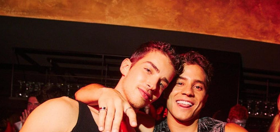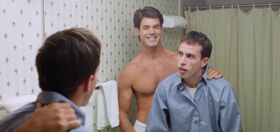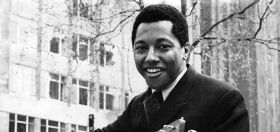
Byron Lane likes to mix it up.
He began his career as a journalist, before trying his hand at screenwriting. Lane created and starred in Last Will & Testicle, a web series based on his own battle with testicular cancer. He returned again with Tilda Swinton Answers an Ad on Craigslist, a cult theatre piece that starred out-gay actor Tom Lenk, and explored Lane’s fascination with the titular actress.
Prior to his forays into showbiz, Lane worked as a Hollywood assistant to actress, writer, and gay icon Carrie Fisher. That relationship has become the basis for Lane’s latest artistic endeavor, his debut novel A Star is Bored.
A Star is Bored follows the life of Charlie, a young, gay aspiring writer who becomes the assistant to a legendary actress, Kathi Kannon. Kannon once ruled Hollywood as the daughter of a famous actress, Gracie Gold, and later, for starring in a series of popular sci-fi movies. Kathi also had well-publicized battles with bipolar disorder and substance abuse. As Charlie’s relationship with the ever-eccentric Kathi deepens, he also comes to face his struggle with depression, and his childhood abuse at the hands of his father.
How about we take this to the next level?
Our newsletter is like a refreshing cocktail (or mocktail) of LGBTQ+ entertainment and pop culture, served up with a side of eye-candy.
We caught up with Lane who is recovering from chemotherapy from cancer treatment to chat about the novel, his relationship with Carrie Fisher and his aspirations as an emerging queer voice. A Star is Born hits bookstores July 28.
So I want to begin with the biggest question: is this book a roman-a-clef? Is the character Kathi meant to be Carrie?
I definitely think it’s a work of fiction. I just wanted to capture the spirit of my time working with Carrie. So that was my goal in writing this. I wanted to capture the friendship, the joy, the good times and some of the truth about the hard times too. But for the most part, my goal was writing a fiction story. That also gave me a lot of freedom to embellish things and whatnot.
When you made the announcement that you were writing the book, did anyone ring you up and say “Don’t write about me?”
No, no. Most people were excited. For example, some of the boyfriend that Charlie dates in the book are inspired by actual dates. Some of my friends were really thrilled by that. But also, since it’s fiction, there is space between reality and the characters in the book.
Is it an irritating feeling to think that people won’t see this as a novel, so much as a tell-all?
I’m so grateful to even have a book. I’ll answer any question about anything, so I don’t mind answering that at all.
That’s very good to hear. One of the surprising themes in the novel for me is child abuse. Charlie’s dad is a beast: vindictive, cruel, degrading, and wildly undeserving of love. How much of that is inspired by your own upbringing? Did you sit your dad down and tell him, “This is not you?”
I definitely warned my dad that it’s fiction. He and I have a pretty great relationship. We had a much more complicated relationship when I was growing up. There are shadows of some of that in the book, but it’s all heightened. In reality, my dad is a really good guy, and a good sport about my writing the dad character, or that he may be mistaken for the dad in some ways. But I did explain to him that it is fiction. My childhood was lovely. There were some rough patches.
As everyone has.
And the book heightens a lot of things, including the character of the dad.
It’s good to hear that you have a good relationship with your dad. I was a little worried.
Yeah. He’s a good guy, a hard-working man. I think if you sat most parents down and asked them if there are things they would do differently, most all of them would say yes. I heard someone on NPR once—this guy who was upset about how he was raised. He was going to confront his father. Then, when he sat down across from this 70-year-old man, the dad of his childhood was gone. He was a new person.
Yeah.
Sometimes I feel that with my own father. We talked recently, and he just talked about how much life changes us. We age, our priorities change. It’s been a really beautiful journey with my dad.
Has he read the book yet?
He just got it. He just started.
Related: Carrie Fisher dies at age 60
I’d be interested to know what he says afterward.
I’ll tell you: if I don’t hear from him for two days in a row, I call and make sure he hasn’t fallen down a dark hole. But so far, so good.
Loneliness is also a recurrent theme in the book. Charlie is so lonely in a way I really identified with, and in a way that I think a lot of queer men will. His crippling sadness and how that leads to promiscuity is hard to read about, in part, because I’ve seen the same thing happen to so many queer men. It’s tough.
Mmmhmm.
Kathi is also a lonely character. She has the “shine,” she can get away with anything, but I also get the sense that part of her drug use stems from her own isolation. Do you think that’s true?
Yeah. I think you’re right. They’re both lonely characters, both isolated. Charlie has fear of the world, and shame about things like his haircut. Kathi is isolated by her fame. So in many ways, it does bring them together and make them two halves of a whole. Because they come at it from these different places—her with all the wealth in the world, him feeling like there’s none—I think it makes for an interesting pair.
As a character, Kathi is both alluring and wildly frustrating. Do you see her as somewhat predatory, in that she’s preying on Charlie’s insecurity, Miss Gracie, all these other people in her life?
No. I always think of Kathi as someone who is suffering. She’s just trying to find relief. Again, in my own personal life, I tried to end my suffering in all kinds of ways: with casual sex, by smoking pot, by self-isolation. I just think she’s on a big journey trying to find some way to end suffering. I don’t think there’s any malice in it. She’s trying. I just see her as human.
Do you think of her as addicted to her own mania?
That’s a good question. When I think about the character Kathi—I don’t think she would say it’s an addiction. She would say that it is a part of her life. Sometimes she wakes up manic, and the world bends to her in that way. Sometimes she wakes up on the other side of it, and she’s depressed, and the world shifts to her in that way. I don’t think it’s calculated or planned. I think she’s a character that goes with the flow: literally like what’s the weather today? She goes there.
That’s interesting. The way she describes her own mania—how she talks about how fun her manic episodes are, it’s almost like she looks forward to it.
I think that’s common in some people who have bipolar disorder. The mania part, I think some people, prefer over the depressive part. I’ve heard of artists who are considered bipolar, and how the mania helps them in creating art. I can see how that plays out.
On the subject of Miss Gracie, she’s adorable and lovable…but very frustrating at times in the way she enables Kathi’s behavior. The way you describe their compound in a way that I thought about Grey Gardens—this odd, insular, codependent world of mother and daughter. Are they codependent?
That’s a good question. The word “codependent” is so charged, and means so many things that are negative. So I don’t know that I want to say they’re codependent. They definitely depend on each other. They’re two people in the same band. When you pluck one out, the music changes, and maybe isn’t as good. I think they relate in that way.
Addiction, of course, plays a very major role here. You’ve witnessed addiction in your own life. What is it you really want people to take away from this story? What do you want them to realize about addiction?
[Long pause]
I guess just that we’re all human. All of us are on a path trying to do our best. At the end of the day, we all want peace. All of us have our own addictions: attention, drugs, likes on Instagram…all of those things are an effort to find peace of mind. We think it will be this relationship or that cigarette or this joint. I think of addiction in those terms. People are looking for peace, and people look for it in misguided ways. At the end of the day, I hope everyone can find peace in a healthy, meaningful way. If this book helps to offer sympathy or clarity of that journey for anyone, that makes me happy.
You really nail how frustrating and wild addiction is, how unpredictable it is. Reading some of these scenes it was really, really tough knowing that there are so many parallels between Kathi and Carrie. I’ll not ask what you witnessed in regards to Carrie and addiction, but when you write scenes like that, is it difficult to revisit those moments in your relationship with Carrie?
I just tried to capture the spirit of that time, which really was a joyful time for me. That’s the main take away. Part of the reason it was joyful, even during tough times, was that we had a great relationship. It was built on respect. I respected her, she respected me. When you respect someone in any relationship, it opens the door to honesty. It opens the door to communication. It opens the door to unconditional love. I felt like I could say anything to her. She felt like she could say anything to me. So when I go to the page, and I write scenes with Kathi and Charlie, I try to bring those same ingredients: respect, honesty, communication, unconditional love.
Sure.
I think that creates a couple things. One, it makes the scenes feel so much more real. We can all relate to having these relationships where we can be honest. Two, honesty in general, is relatable. In my own life when I tell people about problems and I’m honest about it, people are always like I get it. It creates connection. My hope is that people respond to that in the book too. I was just trying to capture the honesty of the moment. I think that’s why it stirs up feelings.
Earlier you mentioned how the characters are just looking for peace. How does writing a story like this find catharsis in your own experiences?
I’ve done so much therapy and have so many self-help books on my nightstand. Some of it is just that: not falling into a trap. As I say, in my own life, I’ve had times [where I thought] sex will bring me peace, or dating will bring me peace, or drugs will bring me peace. I now know that writing the book won’t bring me peace. Peace comes from within.
Yeah.
So there is some pressure off of having the book heal me in some way. But that being said, it was a joyful, healing experience. It made me feel closer to Carrie in harnessing our good times together. So, in that way, just writing about it brought me joy and closure. I miss her. She used to say: “Take your broken heart, and go make art.”
That’s beautiful.
That’s what I tried to do.
For anyone reading this who has not read the work of Carrie Fisher: you’re missing out. She was a sublime writer. Her novels, her memoirs are amazing.
They’re so good.
What kind of advice did Carrie give you about writing? The title is a very Carrie title.
It was a dream to watch her write and see her process. One thing she would do is read before she would write. She always referred to that as “filling the coffers.” She would get herself into a rhythm and grab a yellow legal pad. She wrote almost everything by hand, hand it over to me, and I would type it up for her. And it was always really brilliant. She also loved to use a reverse dictionary, so if she had some idea of a theme, the dictionary would tell her the origins of the word. That would lead to other ideas. So those are some of the tools I picked up from her.
How did working for her expand your realm of thought? What I mean by that, is that she saw the world in a very unusual, quirky way.
Being in her orbit was magical. Everything around her did bend to that magic. I went into the job very serious. I learned from her that I don’t have to take life so seriously. I can catastrophically think about if I’ll get to the airport on time, or if the plane is full, or if we’re sitting together. But things usually work out. So I learned from her I can go in imagining catastrophe, or I can focus on how, most of the time, everything works out.
Wonderful.
Also just to be around someone who does have a kind of magic and playfulness and calm about things being fine—it’s delightfully contagious.
We lost Carrie too young, too soon. If you could tell her one thing now, what would it be?
[A beat]
I miss her. The world misses her. I remember one time, she was doing some kind of comedy show. So they gave us a hotel for the day to hang out before her show that night. She was writing some article for some magazine—I think it was about Princess Leia and being in Leia’s shoes, and living her life that way. I remember reading it and everything I would read of hers I’d walk away thinking it’s brilliant. So I read the article and said “You’re brilliant.” And she was like, “Really? You think it’s good?” I was so shocked that she didn’t know I felt that way.
Wow.
So I was so happy that I said it in that moment and that she got to hear it. I hope she knows how much we loved her.
Well, that leads to another question. Carrie was always dismissive of her fame; she was born into it. She was dismissive of her fans; she always said people really loved Leia, and she was just the keeper of her likeness. Did she know how much we really loved her?
I mean…I think so. But I’d also say that’s a really deep question. Do you know how much you’re loved? Do I know how much I’m loved, just by my own parents or my own friends? For example, with my cancer diagnosis, I posted about it on social media. And I got this outpouring of love. There was a world where I wasn’t going to share anything about it at all. Now I’m hearing from people from high school wishing me the best. And I had no idea, no idea that so-and-so from high school gave a sh*t about me.
Yeah.
So how do any of us quantify how much we’re loved? But for sure, the people around her loved and supported her, and she knew that.
That’s a comfort. So, you’ve been an actor. A playwright. A journalist. Now, a novelist. What are your aspirations as a writer? Actor?
God, I’m grateful to be able to write. I’m kicking around ideas for a second book. I’m kicking around ideas for a pilot, a kind of Waiting for Guffman with the team from Tilda Swinton Answers an Ad on Craigslist. It’s about a silly group of ramschackle folks bringing a show to Broadway. I love writing, and wherever I can make money doing that, I’m happy.
Ok, last question: you’ve been through cancer twice.
It’s so stupid.
Well don’t feel stupid for getting through it!
The cancer is so stupid. My main feeling is that it’s a dumb ordeal to go through. What an inconvenience.
Fair enough. But you’ve been poor, depressed, unemployed. How do you keep going? How do you forgive life?
The thing that immediately comes to mind is therapy.
[Laughter]
I was listening to some self-help audiobook, and I wasn’t into it. I don’t even remember what it was. But someone said, “Does your mind control you, or do you control your mind?” That was really eye-opening to me, and eventually, lead to my realizing how much our thinking affects our experience. That led me to realize we all really want peace. So now I can catch myself when I’m feeling depressed because the grocery store didn’t have the ketchup I wanted. I think, if I get that ketchup, it would bring me peace. It wouldn’t. Even when I wrote the book, I hope people like it, but I know my wanting that is really just me wanting peace of mind. And I can give that to myself anytime.
Does that make me sound like a crazy hippie?
It makes you sound hopeful. People really need hope right now too.
A Star is Bored is available in bookstores July 28.























Mister P
Carrie Fisher was a gay icon?
Chrisk
She was a gay icon the same way Judy Garland was a gay icon i guess. A woman, a troubled life, addictions, etc
Cam
It sounds like he waited until she died, and now is claiming it’s fiction to avoid lawsuits from her heirs.